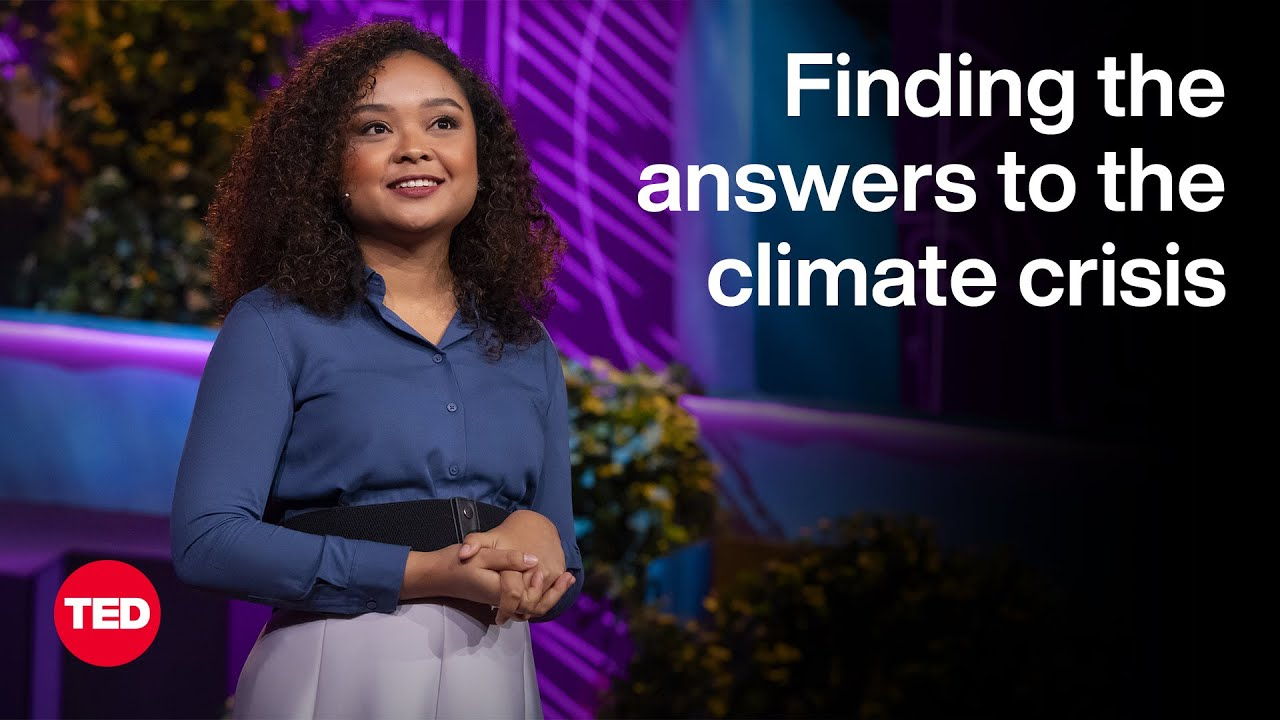The video shares a compelling narrative of how traditional farming wisdom, once thought bizarre, has found a rhythmic alliance with modern science to address climate change and enhance agricultural productivity. The speaker recounts stories from her childhood where practices like planting crops according to lunar cycles and using natural elements like rocks for root crops were dismissed as eccentric, but further exploration and experimentation showed their efficacy. By collaborating with farmers and embracing both scientifically backed and time-tested techniques, her initiative, the Cacao Project, aims to nurture resilient agroforests and sustainable farming methods.
These insights highlight the powerful intersection of ancestral knowledge and current agricultural practices in a time of environmental challenges. The surprising effectiveness of techniques such as planting rocks for better root crop drainage or utilizing lunar cycles to maximize harvest manifest the potential of integrating age-old wisdom into contemporary farming. The speaker’s journey underlines the importance of treating agricultural traditions as substantial contributors to environmental stewardship and not merely folktales.
Main takeaways from the video:
Please remember to turn on the CC button to view the subtitles.
Key Vocabularies and Common Phrases:
1. begrudgingly [bɪˈɡrʌdʒɪŋli] - (adverb) - In a manner that shows unwillingness or reluctance. - Synonyms: (reluctantly, unwillingly, hesitantly)
And I would begrudgingly follow them out and listen to the stories that they had to say.
2. bizarre [bɪˈzɑr] - (adjective) - Strikingly out of the ordinary; peculiar. - Synonyms: (strange, odd, peculiar)
And their pieces of advice would range from totally rational and practical to absolutely bizarre.
3. steward [ˈstuːərd] - (verb) - To manage or look after another's property. - Synonyms: (manage, oversee, administer)
...how we could best steward our ecosystems and landscapes.
4. resilient [rɪˈzɪliənt] - (adjective) - Able to withstand or recover quickly from difficult conditions. - Synonyms: (robust, durable, adaptable)
...to build resilient agroforests that really react best to the intense super typhoons...
5. ecosystems [ˈiːkəʊˌsɪstəmz] - (noun) - A biological community interacting with its environment. - Synonyms: (habitat, environment, community)
...how we could best steward our ecosystems and landscapes.
6. regeneration [rɪˌdʒɛnəˈreɪʃən] - (noun) - The process of renewal, restoration, and growth. - Synonyms: (renewal, revival, restoration)
...being able to teach them regeneration.
7. propagating [ˈprɒpəɡeɪtɪŋ] - (verb) - To spread and promote widely. - Synonyms: (disseminating, spreading, promoting)
...and even propagating the life that strengthens our forests and our trees.
8. sorcery [ˈsɔrsəri] - (noun) - The use of magic, especially black magic. - Synonyms: (witchcraft, wizardry, enchantment)
It was magic. I was like, what is this sorcery?
9. curate [ˈkjʊreɪt] - (verb) - To select, organize, and look after the items in a collection or exhibition. - Synonyms: (organize, arrange, manage)
...to how we can best curate our stewardship to our landscapes...
10. stewardship [ˈstuːərdʃɪp] - (noun) - The responsible overseeing and protection of something considered worth caring for and preserving. - Synonyms: (management, administration, supervision)
...how we can best curate our stewardship to our landscapes...
A Climate Solution? The Wisdom Passed Down Through Generations - Louise Mabulo - TED
When I was a little girl, my parents would take me outside and show me all the incredible ways that they would take care of our land to produce good food. And I would begrudgingly follow them out and listen to the stories that they had to say. And their pieces of advice would range from totally rational and practical to absolutely bizarre. For example, my grandfather would say, hey, Louise, if you want to plant good root crops this season, what you should do is plant some rocks underneath your sweet potatoes. And I would look at him and be like, okay, grandpa, sure, totally believe you.
And my grandmother would say, okay, to have the best harvest of fruits from the fruit bearing trees this season, you want to be able to plant according to lunar cycles. You want to plant towards the full moon and never towards a new moon. And I would look at her and say, what? And my dad, most bizarrely of all, would say, if you want to sift rice or cocoa nibs to get rid of all the dust, the best thing that you can do is to whistle a certain tone to harness the wind. And I'd be like, dad, like airbending. Okay, sure.
So as I grew up, I would ask them, why? Why do we do all these weird, strange things, right? And my relatives and my family would come up to me and be like, Louise, here's the thing, your grandparents are kind of crazy, so this is your traditions. You don't have to think about it, it's fine.
But my work has put me at the front lines of the climate crisis, working with communities and farmers to build resilient agroforests that really react best to the intense super typhoons that we experience. I established an initiative called the Cacao Project, which works to build these resilient agroforests and work closely with farmers to understand how we could best steward our ecosystems and landscapes. And over the years, I've been able to really do my best dream job, which is make chocolates for restoration. And I have the best job I know. I get to eat chocolates, talk to farmers, live on the land and have such a good life.
And we look at the ways that we can marry practical, traditional knowledge techniques with modern science and know how, so that we could really put a spotlight on those simple, practical solutions that react effectively to climate change. Now, over the years, I've trained with farmers and we make sure that learning is a two way street where we listen to the stories that they have to say, but also being able to teach them regeneration. So very simple concepts like putting more carbon back in the soil than we take from it. Or maybe planting the crops that are suited to our ecosystems and our landscapes and even propagating the life that strengthens our forests and our trees.
And as I was talking to these farmers, these crazy stories started resurfacing. And I said, okay, hang on, hang on. Maybe they're onto something here. So together with our farmers, we started kind of trying it out. Okay, let's plant some rocks here and see what happens. Okay, let's plant according to the lunar cycles. And for some reason, every single time that we would do that, it would work. When we plant rocks under sweet potatoes, they were better, sweeter, just more delicious. Every time we planted according to lunar cycles, we'd have delicious harvests.
And I thought, maybe, what if all of these weird stories are just kind of decades of peer review that was passed down from grandmother to grandson, from father to daughter in the ways that they best knew how? And maybe grandma wasn't so crazy after all. So I quickly learned that lunar cycles were actually tied to insect flight activity and reproduction that made better pollinators. So more fruits. It was tied to irrigation and water patterns. And I thought, wow, that is so cool. So my grandmother had a point.
I digress. It turns out planting rocks under root crops, it meant that you were just actually making better drainage. But also it was creating this inviting ecosystem for worms and little creatures to live under, and they were just natural fertilizers. So awesome. Granddad was right. And whistling for wind. Well, I wish I could give you a scientific explanation. I have no idea how that works, but every time I ask my dad, can you bring me out to a field and whistle? A light breeze would always seem to blow. It was magic. I was like, what is this sorcery?
So what if all of these invisible pieces of knowledge are actually keys to how we can best curate our stewardship to our landscapes, how we could best create resilience in our ecosystems and forests to react better to climate change. And all of this knowledge exists in countries and communities and traditions and stories within our families. And as a young person who works in the environmental field, I think it is so cool to have that kind of responsibility to carry this knowledge onto the next generation, to transfer this information over into our modern age and be able to articulate why they work.
Because maybe the solutions to our climate crisis, maybe the next big fix all isn't just this one big, amazing, sparkling solution. Maybe it exists in the soils under our feet. Maybe it's in the wind that blows in the air or the sunlight that beats down on us. Or maybe it exists in the crazy wild stories of our grandmothers. And it is such an honor to think that maybe these amazing solutions are actually an opportunity for us to build something that embodies the wisdom of our communities, of our families, and of our landscapes over years and generations. And as a young person carrying that on, I think, wow, we have some exciting magic in our planet to offer, and hopefully we can harness that power and all this sorcery and secret bits of knowledge to do something really great with it and in different parts of the world that curate our stewardship to our planet.
Innovation, Leadership, Global, Traditional Wisdom, Climate Change, Sustainable Farming, Ted


